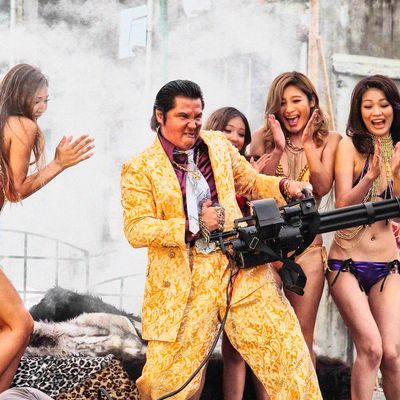
Words can never do justice to the awe-inspiring, brain-eating weirdness of Sion Sono’s Japanese dystopian hip-hop kung-fu musical Tokyo Tribe. Based on a popular manga series by comic artist and urban-fashion impresario Santa Inoue, the film presents us with a kaleidoscopic wasteland of postapocalyptic kitsch, dated street fashions, rap posturing, body horror, hilariously over-the-top violence, and a mash-up of martial arts and dance. But even that litany of influences and styles can’t quite express how insane this film is.
In the film’s opening setpiece, a crane shot follows a young emcee named Show (Shôta Sometani) as he walks through a packed, graffiti-covered street that looks like an alarmist vision out of a ’90s music video. The imagery here is both tongue-in-cheek and epic, but the delivery of Show, our Virgil-like guide to this hellscape, has a brooding poetry. “An earthquake could break at any time,” he raps, “a shaking city never closes its eyes,” speaking to the corrosive, vital unease of the whole movie. The Japanese do apocalypse on film better than anyone, perhaps because they’ve had to live through several real ones — and the specter of the 2011 earthquake looms over Tokyo Tribe.
As do Sion Sono’s pervy teen fantasies. So, to punctuate this remarkable opening sequence, he gives us a rookie female cop (looking more like a strip-o-gram version of a rookie female cop) attempting to confront Merra (Ryôhei Suzuki), the buff, bleached-blond boss of the Bukoro Wu-ronz, one of the street gangs that control the city. While the other cops casually look on, Merra grabs the woman and begins lightly tracing the outline of Tokyo on her bare stomach with a knife, describing each and every gang (or “tribe”) and the turf they inhabit. As he intros them, we see the cocksure posturing of the gangs as they walk toward the camera and rap about themselves and what they’ll do to you if you encroach on their turf. That’s some way to set the stage for a musical, to say the least.
Most of Tokyo Tribe, to the extent that it has a plot, follows the conflict between Merra and Kai (Japanese rapper Young Dais), the likable, peace-loving head of the Musashino Saru. The former has joined forces with Big Daddy (Riki Takeuchi), a fat, cannibalistic, gold-suit-wearing yakuza constantly surrounded by bikini-clad beauties, to lure the various gangs into destroying each other. (He’s also got a psycho sadist of a son who likes to lounge around in a Clockwork Orange–inspired bloodred room with live human furniture.) But the tribes soon turn on Merra and Big Daddy, initiating a massive, extravagant gang war that eats up the film’s second half and features endless rap battles, acrobatic ass-kicking, a tank, a send-up of wire-fu, the occasional dick-measuring contest, and, at one point, a giant buzzsaw built into a wall that sucks people in and instantly turns them into quaint little puffs of blood. There’s also a beatboxing waitress, and a little old DJ grandma who says things like, “Cop these slammin’ beats from the ass-end of hell!”
It should all be either horrifying or hilarious — or, less generously, ridiculous and offensive — but somehow, it’s not. There’s a strange power to Sion’s filmmaking that goes beyond the midnight-movie oddness of the plot. He likes the silly and the strange, but he has the style of a Spielberg; he can work wonders with a camera and make the dumbest ideas work. The garish colors and costumes we’re seeing exist in strange dissonance with the film’s sweeping camera moves, with Sion’s authoritative command of both action and music. He orchestrates the unhinged, surreal chaos of the fight scenes remarkably well. And his performers, many of them accomplished rappers themselves, bring conviction and energy — giving the schlocky goings-on an undercurrent of genuine emotion. When they sing about peace and love, we sense that they mean it, even if they just got done slicing and kicking the shit out of each other in comically gruesome ways. That contrast isn’t accidental, or a miscalculation. Beneath the goofy plot, the tacky fashions, the fronting rappers, and the exploding bodies, there’s an undeniable earnestness to Tokyo Tribe. It’s the craziest film you’ll see this year, but it’s also — dear God, am I really saying this? — one of the sweetest.


